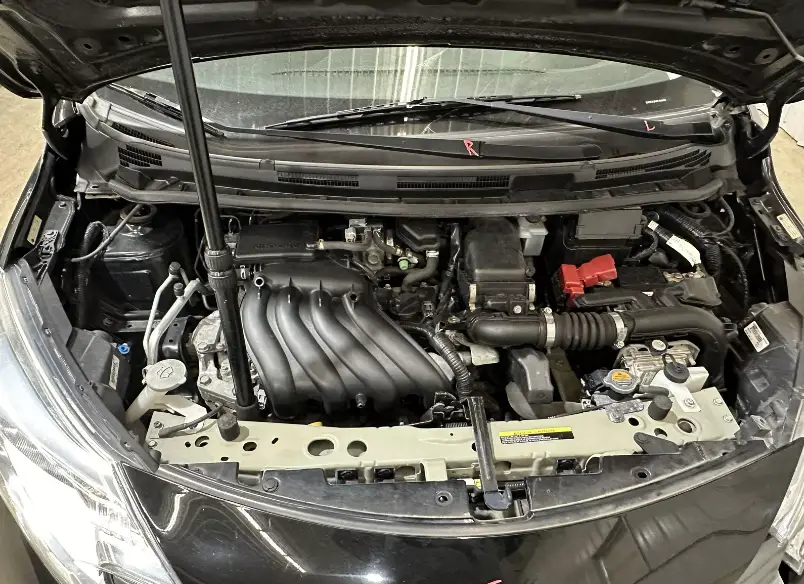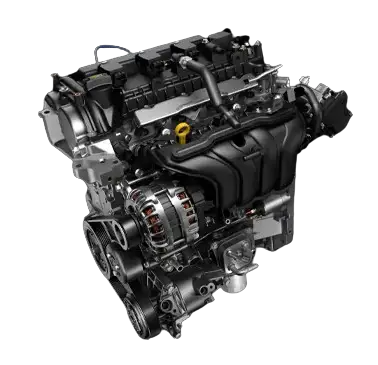The Nissan Versa features a 1.6-liter inline-4 engine with 122 horsepower and 114 lb-ft of torque. It offers excellent fuel efficiency, reaching up to 40 MPG on the highway.
The Nissan Versa has long been a popular choice for drivers seeking an affordable, reliable, and fuel-efficient vehicle. Known for its practicality, the Versa is one of the most budget-friendly sedans on the market, offering a comfortable ride with essential features and a well-balanced design. One of the key aspects that contribute to the Versa’s appeal is its engine, which combines efficiency with adequate performance to meet the needs of everyday driving.
In this blog post, we’ll explore the engine specifications of the Nissan Versa, focusing on its performance, efficiency, technology, and what sets it apart in its segment. Whether you’re considering buying a Nissan Versa or are simply interested in learning more about its powertrain, this detailed guide will provide you with all the necessary insights.

Contents
Nissan Versa
The Nissan Versa is classified as a subcompact sedan and is currently in its third generation, which began in 2020. The car is known for its affordability, spacious interior, and fuel efficiency, making it an ideal option for city driving and long commutes alike.
The most recent generation of the Versa has seen significant improvements in terms of design, technology, and overall performance. However, its engine remains focused on delivering practicality rather than high-performance thrills. This focus on efficiency and reliability is a key selling point for budget-conscious buyers who prioritize low ownership costs and dependable daily use.
Current Nissan Versa Engine Specs
The engine that powers the Nissan Versa is a modest yet efficient unit. The current 2024 Nissan Versa is equipped with a 1.6-liter inline-4 engine, the same engine that has been featured in previous model years of the third generation.
Here’s a breakdown of the essential engine specifications for the 2024 Nissan Versa:
- Engine Type: 1.6-liter DOHC (Dual Overhead Cam) 16-valve inline-4
- Displacement: 1,598 cc (1.6 liters)
- Horsepower: 122 hp at 6,300 rpm
- Torque: 114 lb-ft at 4,000 rpm
- Fuel Delivery System: Sequential multi-point fuel injection
- Compression Ratio: 10.4:1
- Fuel Type: Regular unleaded gasoline
Engine Performance
While the Nissan Versa’s engine isn’t designed for high-speed performance or off-road capability, it excels in the areas of fuel efficiency and everyday usability. The 1.6-liter engine produces 122 horsepower and 114 lb-ft of torque, which, while modest, is sufficient for daily commuting, city driving, and light highway use.
The engine’s DOHC design allows for more precise control over the intake and exhaust valves, improving overall efficiency and smoothness. With a compression ratio of 10.4:1, the engine is optimized to extract as much power as possible from each drop of fuel, without compromising on longevity or reliability.
Transmission Options
The engine is paired with either a 5-speed manual transmission or Nissan’s Xtronic Continuously Variable Transmission (CVT). The CVT is more common in modern Versa models and is designed to optimize fuel efficiency by continuously adjusting to the vehicle’s speed and load, rather than shifting through traditional gear ratios.
- 5-Speed Manual Transmission:
- Available in the base trim, this manual transmission offers more direct control over the vehicle, appealing to those who enjoy a more hands-on driving experience. However, it’s less fuel-efficient compared to the CVT.
- Xtronic CVT:
- The CVT is the more fuel-efficient option and provides smoother acceleration without the jarring shifts of a traditional automatic transmission. It continuously adjusts the engine speed to match the driving conditions, maximizing fuel economy and comfort.
Fuel Efficiency
One of the main reasons buyers are drawn to the Nissan Versa is its impressive fuel economy. The combination of the efficient 1.6-liter engine and the CVT helps the Versa achieve excellent gas mileage, making it one of the most fuel-efficient sedans in its class.
- Fuel Economy with CVT:
- City: 32 MPG
- Highway: 40 MPG
- Combined: 35 MPG
- Fuel Economy with Manual Transmission:
- City: 27 MPG
- Highway: 35 MPG
- Combined: 30 MPG
These figures are in line with what you would expect from a subcompact sedan, and they make the Versa a great choice for drivers who prioritize lower fuel costs. The CVT version, in particular, offers exceptional highway mileage, making it ideal for long-distance commuters.
Engine Technology
While the Nissan Versa’s engine isn’t packed with performance-focused technology, it does feature some key advancements that improve its efficiency, reliability, and drivability.
- Dual Overhead Camshafts (DOHC):
- The DOHC setup allows for more precise control of the engine’s intake and exhaust valves. This results in improved performance, better fuel efficiency, and smoother operation. It also enhances the engine’s durability, ensuring it remains reliable over the long term.
- Sequential Multi-Point Fuel Injection:
- This system delivers fuel to the engine in precisely measured amounts, optimizing combustion for maximum efficiency. This technology not only improves fuel economy but also reduces emissions, making the Versa more environmentally friendly.
- Electric Throttle Control:
- The Versa’s engine is equipped with an electric throttle control system, which replaces the traditional cable throttle with electronic sensors. This allows for more precise throttle control and smoother acceleration.
- Lightweight Design:
- The 1.6-liter engine is designed to be lightweight, reducing the overall weight of the vehicle and improving fuel efficiency. By using lightweight materials in its construction, Nissan has optimized the Versa for better handling and lower fuel consumption.

Engine Durability and Maintenance
The Nissan Versa’s engine is designed for longevity, with a focus on reliability and ease of maintenance. Regular maintenance, such as oil changes, air filter replacements, and spark plug inspections, is essential to keep the engine running smoothly.
Nissan recommends using synthetic oil in the Versa’s engine, as it provides better protection and performance, particularly in extreme temperatures. Following the manufacturer’s recommended maintenance schedule will help ensure that the engine remains in good condition over the life of the vehicle.
Comparison with Competitors
In the subcompact sedan category, the Nissan Versa competes with models such as the Hyundai Accent, Kia Rio, and Toyota Yaris. While the Versa’s engine may not be the most powerful in its class, it strikes a good balance between performance and fuel efficiency.
- Hyundai Accent:
- The Accent comes with a 1.6-liter engine that produces 120 hp and 113 lb-ft of torque, which is similar to the Versa’s engine. However, the Versa offers slightly better fuel economy, particularly on the highway.
- Kia Rio:
- The Kia Rio also features a 1.6-liter engine with 120 hp and 112 lb-ft of torque. The Rio’s fuel efficiency is on par with the Versa, but the Rio has a slightly sportier feel due to its chassis and suspension tuning.
- Toyota Yaris:
- The Toyota Yaris comes with a 1.5-liter engine that produces 106 hp, making it less powerful than the Versa. However, the Yaris is known for its reliability and slightly better handling, though its fuel economy is comparable to the Versa.
Frequently Asked Questions
Here are some FAQs about Nissan Versa engine specs –
How powerful is the Nissan Versa’s engine?
The Nissan Versa is powered by a 1.6-liter inline-4 engine that produces 122 horsepower and 114 lb-ft of torque, offering adequate performance for city driving and daily commutes.
Is the Nissan Versa fuel-efficient?
Yes, the Versa is one of the most fuel-efficient sedans in its class, with an EPA rating of 32 MPG in the city and 40 MPG on the highway when equipped with the CVT.
What type of transmission does the Nissan Versa have?
The Versa comes with either a 5-speed manual transmission or a more fuel-efficient Xtronic CVT, depending on the trim level.
Does the Nissan Versa engine require premium fuel?
No, the Versa’s engine is designed to run on regular unleaded gasoline, making it more affordable to operate.
How often should I service the Nissan Versa’s engine?
Regular maintenance, such as oil changes and air filter replacements, should follow the manufacturer’s guidelines, typically every 5,000 to 7,500 miles, depending on driving conditions.
Conclusion
The Nissan Versa’s 1.6-liter engine is a testament to Nissan’s focus on delivering a balance of performance, efficiency, and reliability in an affordable package. While the engine may not be the most powerful in its segment, it excels in offering excellent fuel economy, low maintenance costs, and smooth drivability. For drivers seeking a budget-friendly, practical sedan with solid performance for everyday use, the Nissan Versa is a standout choice.